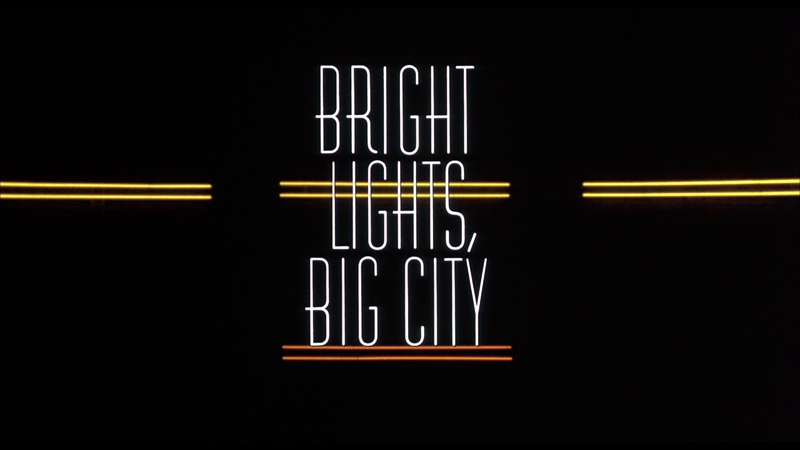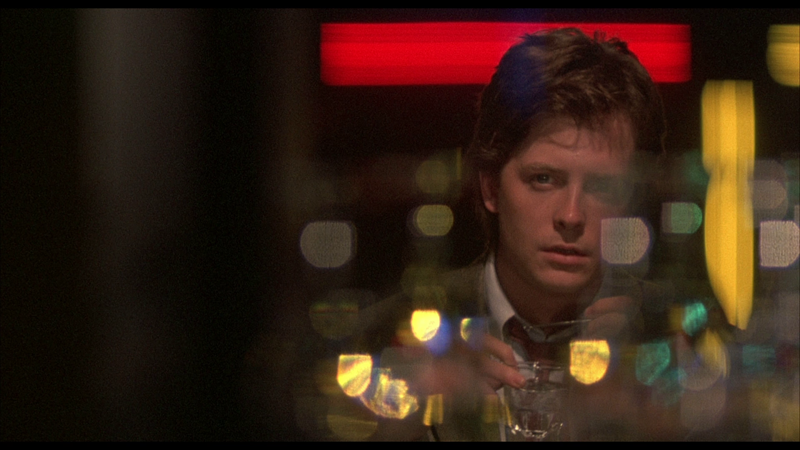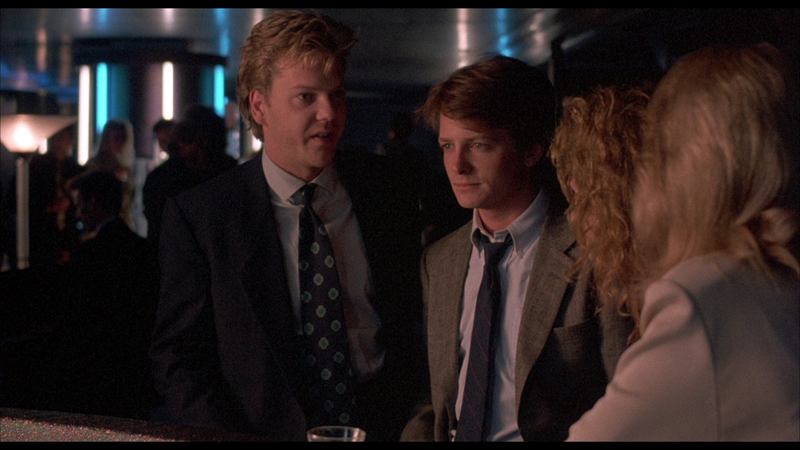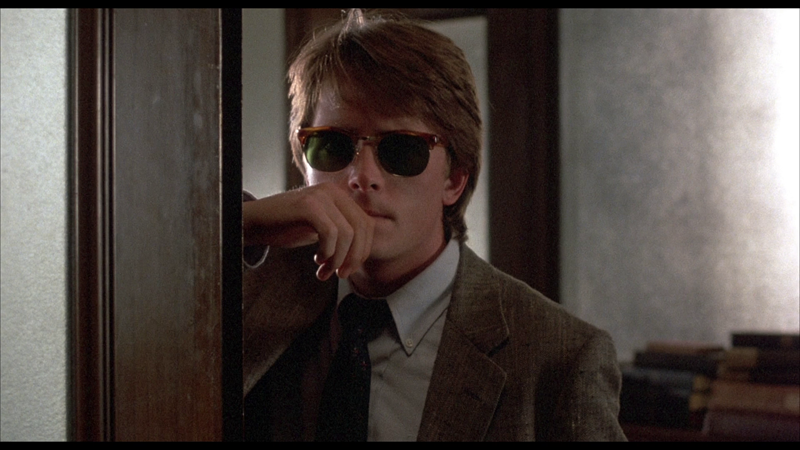| Reviews & Columns |
|
Reviews DVD TV on DVD Blu-ray 4K UHD International DVDs In Theaters Reviews by Studio Video Games Features Collector Series DVDs Easter Egg Database Interviews DVD Talk Radio Feature Articles Columns Anime Talk DVD Savant Horror DVDs The M.O.D. Squad Art House HD Talk Silent DVD
|
DVD Talk Forum |
|
|
| Resources |
|
DVD Price Search Customer Service #'s RCE Info Links |
|
Columns
|
|
|
Bright Lights, Big City
In 10 Words or Less
You can't snort your problems away
Reviewer's Bias*
Loves: Extras on catalog releases, the ‘80sLikes: Michael J. Fox, Kiefer Sutherland
Dislikes: Not getting new extras
Hates: Drugs, partying
The Movie
Following several seasons as America's favorite yuppie, Alex P. Keaton, on Family Ties and the family-friendly, career-defining 1985 double feature of Back to the Future and Teen Wolf, Michael J. Fox was looking for something different to help transition him to adult roles. He certainly found something different in Jamie, the lead of Jay McInerney's screenplay adaptation of his acclaimed debut novel Bright Lights, Big City, a cocaine-fuelled tale of grief and loss, set amongst the hedonism of 1980s young adults. He probably should have been looking for something better though.Jamie is a fact-checker at a prestigious/pretentious New York magazine with dreams of making it as a novelist (much like McInerney himself, who based much of the book on his own experiences, making this a paragon of ‘80s self-indulgence.) His life is spinning out of control, as he parties all night, keeping himself going with nostrils full of "Bolivian marching powder," encouraged by his buddy/walking bad habit Tad (Kiefer Sutherland). Everyone is wondering where Jamie's model wife Amanda (Phoebe Cates) is and he's struggling at work, unable to focus and unable to get up on time after closing out the clubs. It's hard to see any light at the end of the tunnel for this adorable little cokehead.

One wonders if the main actors in this film--including Dianne Wiest as Jamie's mother, Swoosie Kurtz and his work friend and Jason Robards as an editor at the magazine---didn't have such well-liked careers, would this movie be remembered today? If you remove Fox as the spiraling nice guy, Sutherland as the suave, coke-loving devil, Cates as, well, not much of anything, or Wiest, Kurtz and Robards, what's left? The depiction of drug use, though certainly less-prevalent at the time in mainstream film, is hardly shocking--Fox isn't reduced to debasement to feed his habit--and the most "taboo" elements in this movie beyond that are a lesbian kiss and a cross-dressing man. The only thing that is truly different in any way, is the use of second-person narration, a carry-over from the book, where it has a far larger impact, due to its relatively rare usage in literature. In the film, it's just a few lines here or there. In the end, the film is far less a cocaine version of Requiem for a Dream and more like what a grandmother would imagine after someone told her about how her friend's grandson got involved in drugs: a high-gloss, high-budget afterschool special,

The Disc
Bright Lights, Big City is the 12th entry in the MVD Rewind Collection, and arrives on one Blu-ray disc in a clear keepcase with a slipcover that merits its use, as it is a video store-shelf worn version of the cover art, complete with damaged store stickers. (If you have ever had the chance to be in a video store, you have no idea what you've missed out on.) The throwback theme carries onto The disc's animated menu provides the choice to watch the film, select scenes, adjust languages and check out the special features. Audio options include English LPCM 2.0, Spanish Dolby Digital 1.0 and French Dolby Digital 2.0, while subtitles are available in English, Spanish and French.
The Quality
Though there's no indication that this is a new master, the AVC-encoded, 1080pm 1.85:1 transfer here is rather attractive to watch, with a very high level of fine detail (where focus allows for it, as sometimes it seems the focal point is oddly selected.) The delineation in hair styles (a must for the ‘80s) and textures in the clothing and fabrics is on point, and color is spot-on, capturing both the bold (like Kurtz' red-orange blouse) and the muted (the beige of the bathrooms) with equal aplomb, while grain is deep and consistent. At the right distance, you'd have no idea that this film is 30 years old, as it exhibits no noticeable scars and suffered no problems in the transition to digital.The LPCM 2.0 track on this disc is quite solid, keeping the dialogue clear and well separated from the music and sound effects, while the music has nice heft, especially right off the bat with the opening titles, which exhibit some separation between the channels. With proper receiver settings, you'll get a nice deep aural experience, particularly during the fashion show scene, which is really impressive for a 2.0 track. The subway transition device is similarly striking.
The Extras
All of the extras on this release were previously found on MGM's 2008 special-edition DVD, with nothing missing here. Unfortunately, nothing was added, so it's all archival material, starting with a commentary from McInerney. He discusses the making of the film from his perspective as both the author and screenwriter, including observations on how his own life relates to Jamie's in the movie/book. There's some quiet spots and some narration between his musings, but he also, in an interesting touch, talks about a rivalry between Fox and Sutherland.The late cinematographer Gordon Willis--who worked on some of the greatest films in history, including The Godfather, Manhattan and a slew of others--provided a commentary of his own, and the result is an insightful and info-filled track on what a DP does, how the production on this film went and how he created and collaborated. Anyone with an interest in the art of cinematography should give this a listen. Thankfully it was committed to tape before Willis passed.
There's more from McInerney--sort of--in "Jay McInerney: The Light Within" (12:11) in which he touches on his early beliefs on the idea of writing, his use of second-person narration, how he named the main character (who didn't have a name in the book), and the conflict whether the book is a work of the ‘80s or a timeless work. There's some repetition from the commentary, but there's enough there to be worth a look.
There's also a retrospective appreciation of the film in the 14:55 "Big City Lights" featuring a trio of admirers: music writer Mick Stingley, pop-culture historian Gary West and psychology professor and author Jean Twenge. They talk a lot about the movie in the context of the time and as representative of New York in the ‘80s for a young adult.
The extras wrap up with a 3:53 automatic photo gallery, with stills and promo images for the film.
In the package, there's a fold out poster (approximately 9" x 11") of the disc's cover art.

The Bottom Line
Though it succeeds as a nostalgic time capsule of 1980s New York, Bright Lights, Big City's appeal as a movie is limited by its struggles to tell a meaningful story, instead offering mostly exposition and a well-liked cast, and a setting and tone that stays clear of truly pushing the envelope (unaided by Fox's inability to overcome his likability.) This entry in the MVD Rewind Collection looks and sounds great, and carries over the extras found in the previous special-edition DVD but doesn't add anything, making it an upgrade for only the hardest of the hardcore fans. But even if you only watch it for the Willis commentary (which looks to be the only one he ever recorded) it's worth checking out.
Francis Rizzo III is a native Long Islander, where he works in academia. In his spare time, he enjoys watching hockey, writing and spending time with his wife, daughter and puppy.Follow him on Twitter
*The Reviewer's Bias section is an attempt to help readers use the review to its best effect. By knowing where the reviewer's biases lie on the film's subject matter, one can read the review with the right mindset.
|
| Popular Reviews |
| Sponsored Links |
|
|
| Sponsored Links |
|
|
| Release List | Reviews | Shop | Newsletter | Forum | DVD Giveaways | Blu-Ray | Advertise |
|
Copyright 2024 DVDTalk.com All Rights Reserved. Legal Info, Privacy Policy, Terms of Use,
Manage Preferences,
Your Privacy Choices | |||||||














